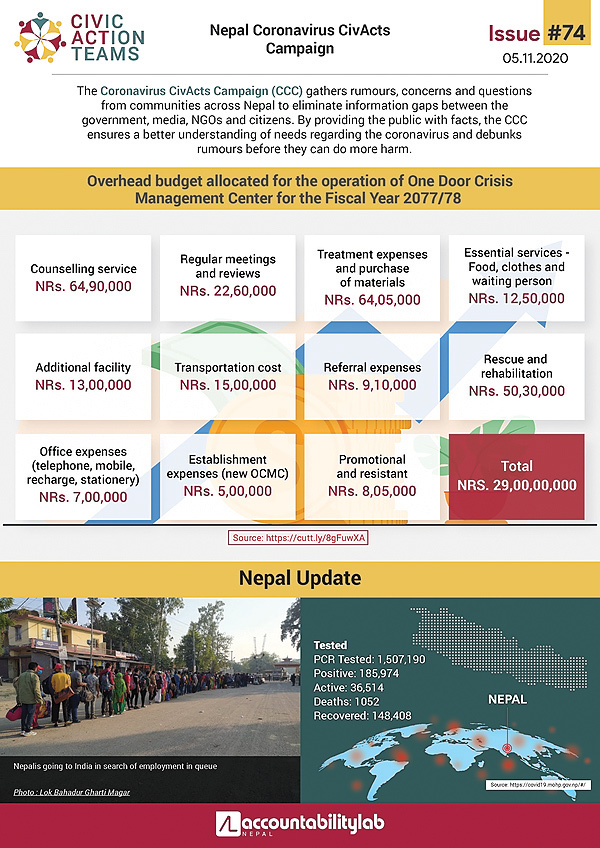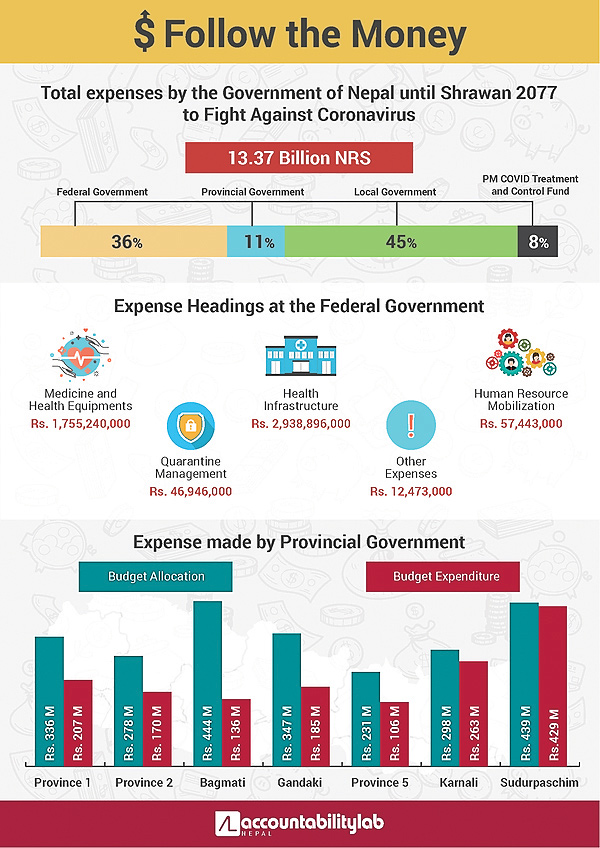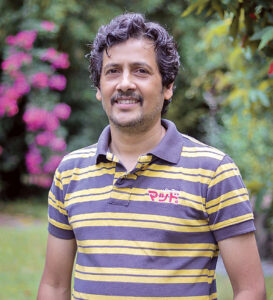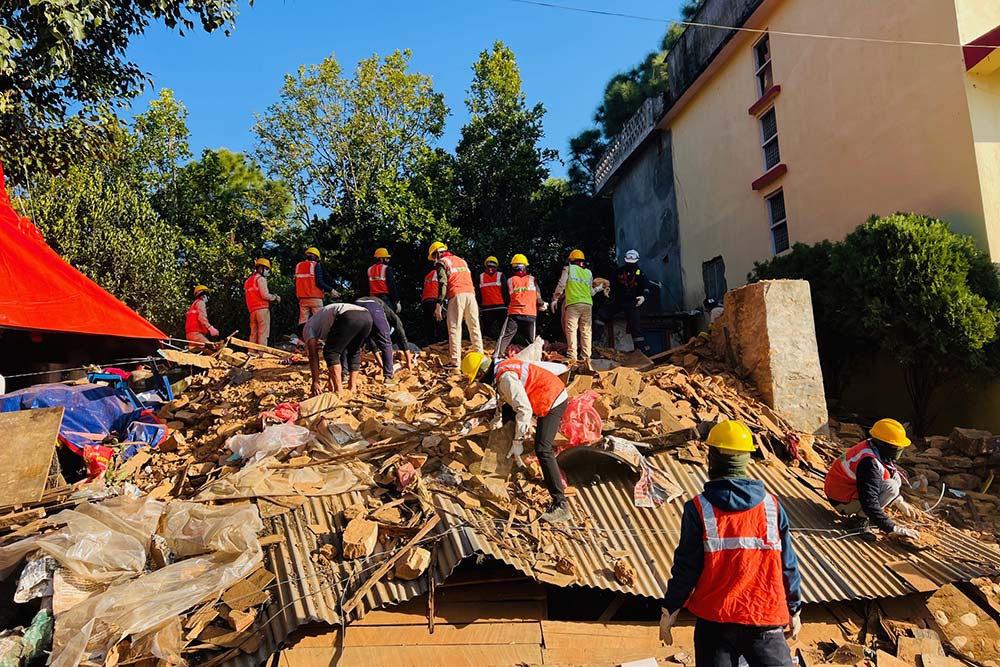
From April to mid-August, 753 local governments have spent Rs 6.0281 billion on COVID 19 response out of a total of Rs 11.9831 billion spent in the review period by the three tiers of the government. Local governments are mainly involved in awareness, quarantine management, advancing the hospitals at the local level for the treatment of critical patients, distributing relief to those with lost income sources (mainly daily wage labourers), and monitoring. A large chunk of the budget - around a billion rupees - is spent on monitoring which has raised eyebrows and made the public question the government’s accountability.
In the federal system, local governments work closer to the public and they are authorised accordingly. Still there are issues of capacity enhancement and accountability for expenses of every single penny contributed by the taxpayer to the government coffer. The irregularities and mismanagement of already scarce resources in the context of the public health crisis will bleed people white along with manifold challenges in the society and economy. It will only widen the vertical and horizontal gaps in the federal system.
Against this backdrop, the Accountability Lab which is a non-governmental organisation engaged with the global network of local Accountability Labs to build accountability, transparency and open government has been tracking the taxpayer’s money and also helping the local governments to handle the public health crisis better.
The Accountability Lab’s new initiative Civic Action Teams (CivActs) is a pioneer citizen feedback tool that ensures that everyone understands how and when development will take place, builds accountability into local decision making in real-time and closes the feedback loop between citizens, governments, the media, donors, and the private sector.

 Narayan Adhikari, Director and Co-founder of the Accountability Lab Nepal has said that local governments were seen reluctant to take support from them. However when they understand that handling public health crises is not possible only from the government machinery, then they join hands with the civil society organisations, NGOs and the private sector to combat the pandemic. Adhikari and his team founded a new initiative called Civic Action Teams (CivActs) in 2015 after the earthquake. The initiative is now active in providing voice to citizens to ensure their feedback builds accountability in pandemic.
CivActs is a pioneering citizen feedback, dialogue and community voice platform to ensure accountability in the development process. CivActs have now information from hundreds of communities across Nepal solving daily problems of the citizens and closing the loop on challenges related to everything from migration to human trafficking to the functioning of the local government.
Narayan Adhikari, Director and Co-founder of the Accountability Lab Nepal has said that local governments were seen reluctant to take support from them. However when they understand that handling public health crises is not possible only from the government machinery, then they join hands with the civil society organisations, NGOs and the private sector to combat the pandemic. Adhikari and his team founded a new initiative called Civic Action Teams (CivActs) in 2015 after the earthquake. The initiative is now active in providing voice to citizens to ensure their feedback builds accountability in pandemic.
CivActs is a pioneering citizen feedback, dialogue and community voice platform to ensure accountability in the development process. CivActs have now information from hundreds of communities across Nepal solving daily problems of the citizens and closing the loop on challenges related to everything from migration to human trafficking to the functioning of the local government.


 Narayan Adhikari, Director and Co-founder of the Accountability Lab Nepal has said that local governments were seen reluctant to take support from them. However when they understand that handling public health crises is not possible only from the government machinery, then they join hands with the civil society organisations, NGOs and the private sector to combat the pandemic. Adhikari and his team founded a new initiative called Civic Action Teams (CivActs) in 2015 after the earthquake. The initiative is now active in providing voice to citizens to ensure their feedback builds accountability in pandemic.
CivActs is a pioneering citizen feedback, dialogue and community voice platform to ensure accountability in the development process. CivActs have now information from hundreds of communities across Nepal solving daily problems of the citizens and closing the loop on challenges related to everything from migration to human trafficking to the functioning of the local government.
Narayan Adhikari, Director and Co-founder of the Accountability Lab Nepal has said that local governments were seen reluctant to take support from them. However when they understand that handling public health crises is not possible only from the government machinery, then they join hands with the civil society organisations, NGOs and the private sector to combat the pandemic. Adhikari and his team founded a new initiative called Civic Action Teams (CivActs) in 2015 after the earthquake. The initiative is now active in providing voice to citizens to ensure their feedback builds accountability in pandemic.
CivActs is a pioneering citizen feedback, dialogue and community voice platform to ensure accountability in the development process. CivActs have now information from hundreds of communities across Nepal solving daily problems of the citizens and closing the loop on challenges related to everything from migration to human trafficking to the functioning of the local government.

They approached our frontliners to seek real time feedback from the public and consulted us for better response mechanisms. The unlikely networks also provided opportunities for the private sector to understand public concerns and share responsibility.
What do they do?
The Accountability Lab has worked with many local governments including the Nepalgunj sub-metropolitan city which was a Covid 19 hotspot once and managed the pandemic with the joint effort of many stakeholders. The Lab started to closely monitor the Covid situation and held discussions within its networks and the community virtually. Based on these discussions, there was quick realisation that rumors and fake news were spreading rapidly on the ground. In the beginning, since the government had enforced lockdown, there were widespread rumors and the federal government had not been able to provide guidelines and the funds to the local government to combat the pandemic. A large number of migrant returnees from India were stranded at the Indo-Nepal border points including Nepalgunj, Butwal, Birgunj, Dhangadhi among others. “Seeing the situation, the Lab felt it was absolutely critical to ensure that essential and validated information reached the citizens. It would also help the government to navigate their response during the pandemic in a responsible manner. This would eventually bolster trust which is essential in times of crisis,” Adhikari shared with Business 360. The Lab started the Coronavirus CivActs Campaign using its network of youth leaders on the frontline from various backgrounds including social activists, journalists and entrepreneurs across the provinces to collect information, concerns and questions, and disseminate validated information back to the communities. The team in Kathmandu which had access to the internet and contact with various government bodies conducted research and contacted experts to find answers to these concerns and brought together all the information creatively with infographics and pictures in bulletins which were easy to understand. To make it accessible to everyone, the bulletins were published in three different languages: Nepali, Maithili and English. They were disseminated back to the communities by existing networks through social media, emails, websites, phone calls, and WhatsApp. Further various local radio stations supported the Lab in spreading these messages in the form of dialogues to make them more interesting. Some of the false beliefs that had to be tackled were: people in Nepal are less likely to contact Covid 19 as a large number of the population has undergone BCG vaccination; having turmeric water and washing hands with warm water can cure Covid 19, etc. There were also growing concerns about regular check-ups for pregnant women, safety of health workers and slow response from the government which had created distrust among the communities.Ensuring accountability
The Accountability Lab Nepal team started tracking budget allocations and spending of all three levels of the government. As the information regarding government spending was very scattered and difficult to contemplate with some key elements even missing, the team brought together this scattered information on the government’s budget spending into one place for the public to evaluate. In order to create a clear understanding among the citizens on government decisions and mechanisms, the Lab also regularly published updated information on government Covid 19 responses and disseminated this among stakeholders. This has paved the way for communities to hold leaders accountable for their actions, especially regarding Covid response spending. Over time, many other organisations working on diverse issues such as gender, labour migration, youth and governance joined in the efforts of the Accountability Lab. These networks of CSOs, government officials, filmmakers and artists added value to the campaign with new ideas and critical feedback as well as fostered collective action. Adhikari added that part of the problem has been lack of transparency and information for the general public on how the process of pandemic response should proceed. Whether it’s making sure that people understand the timeline for compensation disbursements or knowing where to go for help, the government must be transparent and proactive in communication. The lack of information has been a major challenge for many Nepalis, especially the poor and the disadvantaged from the remote areas. “Therefore we crowdsource information related to public finance, create infographics and other visuals to inform and empower citizens and leaders to generate more debate on why and how the money can be utilised more effectively. Without transparency on public funds or local government decision making processes no communities can seek accountability from them,” he elaborated.Making Informed Decisions
The approach of building information depositories helps various agencies such as local governments and other tiers of government in making effective and timely decisions. The local government such as Nepalgunj, Damauli and Surkhet has been facing enormous challenges on how to create awareness among their citizens on various aspects of Covid 19. “They approached our fronliners to seek real time feedback from the public and consulted us for better response mechanisms. The unlikely networks also provided opportunities for the private sector to understand public concerns and share responsibility,” says Adhikari.Getting Frontliners heard
The campaign has provided a platform for frontliners particularly women leaders to share their experiences, challenges and provide feedback to the government. The Lab has organised various webinars in collaboration with other stakeholders to bring out key accountability issues from the ground and share them with concerned bodies. The Lab is promoting positivity on the work of public administration, their efforts to bring frontliners voices to the table has built trust among the public, solved difficult problems with simple solutions, connected and built an unlikely network of hard working public servants, elected officials and civil society leaders to exchange ideas.Opportunity Ahead
Covid 19 is deadly and devastating. It has claimed millions of lives globally. It has affected lives and economies. It has changed how we live and work. The pandemic has posed challenges to the Lab’s way of working as its primary form of interaction is through face to face meetings and dialogues. However it has also created opportunities for the team to adapt to the virtual world using multiple new technologies such as e-bulletins and WhatsApp Business. While it has been challenging to reach marginalised communities as many of them do not have access to the internet and/or cannot read, different alternatives such as live streaming, phone calls, webinars, and volunteer networks have been introduced to accommodate their voices and increase community outreach .Pandemic is hard, a softer approach does not work
The battle is multidimensional. For many, fighting against the pandemic is about dealing with health crises, but it also goes beyond that. The pandemic also propelled corruption, lack of accountability, crunched citizen’s fundamental rights, and divided societies. Covid 19 not only alienated masses to poverty but also disrupted social trust which perpetuated corruption on a wider scale. The only way to build back better is to build and adapt to change with innovative solutions that are people centric.
Published Date: November 18, 2020, 12:00 am
Post Comment
E-Magazine
RELATED Feature





